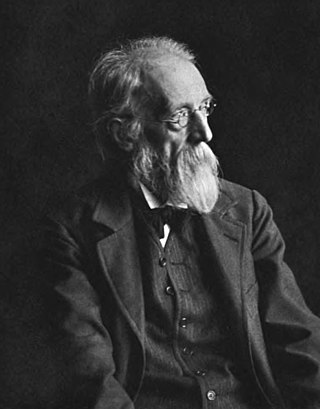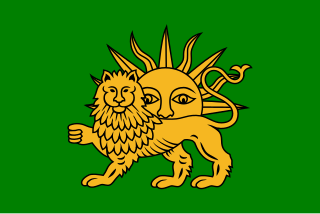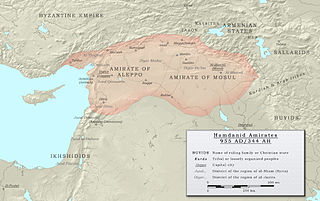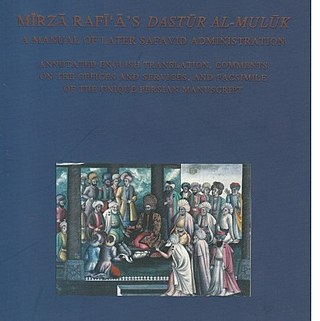Related Research Articles

Sufism, also known as Tasawwuf, is a mystic body of religious practice found within Islam which is characterized by a focus on Islamic purification, spirituality, ritualism, asceticism, and esotericism. It has been variously defined as "Islamic mysticism", "the mystical expression of Islamic faith", "the inward dimension of Islam", "the phenomenon of mysticism within Islam", the "main manifestation and the most important and central crystallization" of mystical practice in Islam, and "the interiorization and intensification of Islamic faith and practice".

Theodor Nöldeke was a German orientalist and scholar. His research interests ranged over Old Testament studies, Semitic languages and Arabic, Persian and Syriac literature. Nöldeke translated several important works of oriental literature and during his lifetime was considered an important orientalist. He wrote numerous studies and contributed articles to the Encyclopædia Britannica. He is credited with starting the higher criticism of the Qur’ān.

The Safavid dynasty was one of Iran's most significant ruling dynasties reigning from 1501 to 1736. Their rule is often considered the beginning of modern Iranian history, as well as one of the gunpowder empires. The Safavid Shāh Ismā'īl I established the Twelver denomination of Shīʿa Islam as the official religion of the Persian Empire, marking one of the most important turning points in the history of Islam. The Safavid dynasty had its origin in the Safavid order of Sufism, which was established in the city of Ardabil in the Iranian Azerbaijan region. It was an Iranian dynasty of Kurdish origin, but during their rule they intermarried with Turkoman, Georgian, Circassian, and Pontic Greek dignitaries, nevertheless they were Turkic-speaking and Turkified. From their base in Ardabil, the Safavids established control over parts of Greater Iran and reasserted the Iranian identity of the region, thus becoming the first native dynasty since the Sasanian Empire to establish a national state officially known as Iran.

The Hamdanid dynasty was a Shia Muslim Arab dynasty of Northern Mesopotamia and Syria (890–1004). They descended from the ancient Banu Taghlib tribe of Mesopotamia and Arabia.

Ayn-al-Qużāt Hamadānī, also spelled Ain-al Quzat Hamedani or ʿAyn-al Qudat Hamadhani (1098–1131), full name: Abu’l-maʿālī ʿabdallāh Bin Abībakr Mohammad Mayānejī, was a Persian jurisconsult, mystic, philosopher, poet and mathematician who was executed at the age of 33.

Dastūr al-Mulūk by Moḥammad Rafiʿ Anṣāri known as Mirzā Rafiʿā, is one of only three surviving administrative handbooks from early 18th-century Safavid Iran and an important research tool for scholars in Iranology. The Persian manuscript was edited during the 1960s by the Iranian scholar Mohammad Taqi Danesh Pajouh.

The Baku Khanate, was a khanate under Iranian suzerainty, which controlled the city of Baku and its surroundings from 1747 to 1806.

Reynold Alleyne Nicholson, FBA, or R. A. Nicholson, was an eminent English orientalist, scholar of both Islamic literature and Islamic mysticism and widely regarded as one of the greatest Rumi scholars and translators in the English language.
Shaykh Ali Khan Zanganeh, was an Iranian statesman of Kurdish origin, who served as the grand vizier of the Safavid king (shah) Suleiman I from 1669 to 1689. Due to his efforts in reforming the declining Iranian economy, he has been called the "Safavid Amir Kabir" in modern historiography.
Iranians in the Netherlands form one of the newer and larger populations of the Iranian diaspora in Europe. Iranians in the Netherlands are referred to by hyphenated terms such as Dutch-Iranians, Iranian-Dutch, Dutch-Persian, or Persian-Dutch. Similar terms Iraanse Nederlanders, Nederlandse Iraniërs, and Perzische-Nederlanders may be found in Dutch-language media.

Kaiser Aminpour was an Iranian poet. Aminpour was one of the several distinguished poets who can be considered the founder of post-Revolution Iranian poetry.
Lin Nu was a Chinese merchant and scholar in the early Ming dynasty. He is the ancestor of the late Ming philosopher Li Zhi. His family was Han Chinese in origin and the branch that remained true to Han culture cut off the Lin Nu's branch for marrying a foreigner and converting to another religion.
The thousand-year celebration of Ferdowsi's birthday was held in Berlin on 27 September 1934 under the administration of the German Ministry of Science, Education and Culture (Reichserziehungsministerium), on the occasion of millenary celebration of Ferdowsi, announced by the government of Iran at the beginning of that year. The Berlin ceremony was held in the German Archaeological Institute. The Zeitschrift der Deutschen Morgenländischen Gesellschaft published a report of these ceremonies in its 1934 edition.
Shamkhal Sultan, was an important Kumyk noble of the second half of the 16th century in the Safavid Empire.

Persecution of Sufis over the course of centuries has included acts of religious discrimination, persecution, and violence both by Sunni and Shia Muslims, such as destruction of Sufi shrines, tombs and mosques, suppression of Sufi orders, murder, and terrorism against adherents of Sufism in a number of Muslim-majority countries. The Republic of Turkey banned all Sufi orders and abolished their institutions in 1925, after Sufis opposed the new secular order. The Islamic Republic of Iran has harassed Sufis, reportedly for their lack of support for the government doctrine of "governance of the jurist".

Sultan-Agha Khanum also in Western sources Corasi was a Safavid queen consort of Kumyk origin, as the second wife of Safavid king Tahmasp I.
The Khalifeh family, also known as the Khalifeh sayyids, were a branch of the Marashi dynasty of Mazandaran, whose ancestor, Amir Nezam al-Din, had settled in the Golbar quarter of Isfahan in the 15th century.
Mirza Mohammad Mahdi Karaki was an Iranian cleric and statesman, who served as the grand Vizier of the Safavid king (shah) Abbas II, and the latter's son and successor Suleiman I. He was the son of Mirza Habibollah Karaki, who served as the sadr-i mamalik from 1632/3 till his death 1650.
Mohammed Rustom is Full Professor of Islamic studies and global philosophy at Carleton University in Ottawa, Canada and Director of the Carleton Centre for the Study of Islam. An internationally recognized scholar whose works have been translated into a dozen languages, his research interests include Arabic and Persian Sufi literature, Islamic philosophy, Qur’anic exegesis, translation theory, and cross-cultural philosophy.
References
- ↑ Gunābādiyya , retrieved 2014-02-25
- ↑ Bos, Van Den; e. w, Matthijs (June 2012), "Dhahabiyya", Encyclopaedia of Islam, Three, retrieved 2014-02-25
- ↑ Bos, Van Den; e. w, Matthijs (October 2015), "ʿAbd al-Ḥusayn Mūnis ʿAlī Shāh", Encyclopaedia of Islam, Three, retrieved 2015-10-25
- ↑ Riḍā ʿAlī Shāh Dakanī , retrieved 2020-03-12
- ↑ Dakanī, Maʿṣūm ʿAlī Shāh , retrieved 2020-03-12
- ↑ The Wenner-Gren Foundation: About Grantees , retrieved 2014-02-25
- ↑ Bos, Matthijs van den (2002), Mystic Regimes, Brill, ISBN 978-9004128156
- ↑ Badry, Roswitha (2009), "ZDMG Review of Mystic Regimes", Zeitschrift der Deutschen Morgenländischen Gesellschaft, 159 (1): 226–230, JSTOR 10.13173/zeitdeutmorggese.159.1.0226
- ↑ Heck, Paul L. (2004), "IJMES Review of Mystic Regimes", International Journal of Middle East Studies, 36 (2): 338–340, doi:10.1017/S0020743804592061, JSTOR 3880073